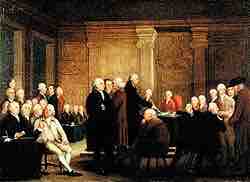When the Second Continental Congress came together on May 10, 1775 it was, in effect, a reconvening of the First Continental Congress . Many of the same 56 delegates who attended the first meeting were in attendance at the second, and the delegates appointed the same president, Peyton Randolph, and secretary, Charles Thomson. Notable new arrivals included Benjamin Franklin of Pennsylvania and John Hancock of Massachusetts. Within two weeks, Randolph was summoned back to Virginia to preside over the House of Burgesses; he was replaced in the Virginia delegation by Thomas Jefferson , who arrived several weeks later. Henry Middleton was elected as president to replace Randolph, but he declined, and Hancock was elected president on May 24.

Second Continental Congress
The Congress signing the Declaration of Independence.
By the time the Second Continental Congress met, the American Revolutionary War had already started with the battles of Lexington and Concord. The Congress was to take charge of the war effort. For the first few months of the struggle, the Patriots had carried on their struggle in an ad hoc and uncoordinated manner. They had seized arsenals, driven out royal officials, and besieged the British army in the city of Boston. On June 14, 1775, the Congress voted to create the Continental Army out of the militia units around Boston and quickly appointed Congressman George Washington of Virginia as commanding general of the Continental Army. On July 6, 1775, Congress approved a Declaration of Causes outlining the rationale and necessity for taking up arms in the thirteen colonies. On July 8, Congress extended the Olive Branch Petition to the British Crown as a final attempt at reconciliation. However, it was received too late to do any good. Silas Deane was sent to France as a minister (ambassador) of the Congress. American ports were reopened in defiance of the British Navigation Acts. Although it had no explicit legal authority to govern, it assumed all the functions of a national government, such as appointing ambassadors, signing treaties, raising armies, appointing generals, obtaining loans from Europe, issuing paper money (called "Continentals"), and disbursing funds. The Congress had no authority to levy taxes, and was required to request money, supplies, and troops from the states to support the war effort. Individual states frequently ignored these requests.